CQ WEEKLY – COVER STORY
Sept. 1, 2012 – 12:52 p.m.
Hitting Harder in Round Two
By Steven T. Dennis
Eight years after

|
||
|
Obama’s call at the 2004 Democratic National Convention for a post-partisan brand of politics propelled him onto the national stage. Four years later, as the Democratic presidential nominee, he strode triumphantly into Denver’s Mile High Stadium, confident that his message of hope and change would transcend the partisan bickering that had long defined Washington. The possibility that an African-American first-term senator with the middle name Hussein could win the presidency set off a wave of optimism about the potential reach of his accomplishments.
Obama’s agenda has now hit a wall of Republican and tea-party-fueled resistance. And the president is under constant attack from Republican lawmakers and right-wing commentators as, at best, a big-spending liberal and, at worst, a socialist demagogue whose beliefs are foreign to American ideals.
The sluggish economy and persistent joblessness are the most serious blemishes on Obama’s first-term record, providing an opening for Republicans to attack not only his competence, but also the administration’s 2009 stimulus law, its 2010 overhauls of health care and financial services, and its derailed effort to forge a bipartisan agreement that would curb the budget deficit.
Months ago, this prompted the frustrated president to take a tougher approach. Obama halted outreach efforts to Speaker
In many ways, Obama’s re-election bid embodies the political realities and pressures facing his presidency. On the campaign trail, he vows to rebuild the beleaguered middle class. He runs against an unpopular Congress and takes aim at the economic credentials of Republican presidential nominee Mitt Romney. Essentially, his bid reflects his transformation from an inspirational force to a president asking voters to renew their faith in his ability to finish the job, despite opponents, and to deliver a nation “built to last.”
“Hell hath no fury like an idealist scorned,” says Ross Baker, a Rutgers political science professor who has served two stints as resident scholar in the office of Senate Majority Leader
Allan Lichtman, a professor of history at American University, said Obama ultimately “accepted the universe, and the universe was he couldn’t sweet-talk this Congress. It isn’t Boehner’s Congress. This is the tea party Congress. You couldn’t sweet talk it, couldn’t bribe it, couldn’t persuade it.”
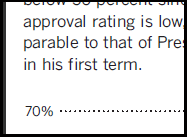
|
||
|
In accepting his party’s nomination on stage at Bank of America Stadium in Charlotte this week, Obama will summon some of his trademark soaring rhetoric. Earlier this year, he kicked off his re-election bid by saying that his campaign is “still about hope” and “still about change.” Robert Gibbs, a senior adviser, said Obama will lay out “a strong contrast but also talk about the hopes and dreams that he has for this country.” The president’s re-election appeal particularly takes aim at the growing gap between the rich and the poor, with Romney as his patrician foil and Republicans in Congress as his daily punching bag.
The Obama campaign has waged relentless attacks on Romney this summer, focusing on the former Massachusetts governor’s refusal to disclose anything other than his 2010 federal tax returns and an estimate of his 2011 taxes and on his tenure at Bain Capital, a private equity firm he established. In highlighting Romney’s former Swiss bank account, offshore holdings and complex investments, the campaign has painted a picture of an opponent out of touch with most Americans and of a wealthy man eager to use shelters to minimize his taxes while middle-class workers pay higher effective federal tax rates.
Fairness, the theme the president’s re-election team seized on a year ago as its answer to the shaky trajectory of the economy and to high unemployment, is central. When some Democrats balked at the campaign’s early assault on Bain Capital, the president rebuked them, saying, “This is what this campaign is going to be about.”
Hitting Harder in Round Two
Still, he is unwilling to forsake his drive to end the bitter partisanship that has consumed Washington, and the effort to do so continues to be part of his re-election pledge. “This is still the president’s goal, but he mistakenly believed that, at least early in his term, Republicans would work with us,” said Democratic Sen.
The Dream of Post-Partisan Politics
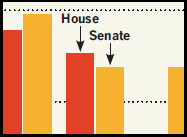
|
||
|
That approach may win the president another four years, but there is little sign that the partisan divide in Congress will diminish or that an era of political cooperation will be ushered in. Even the president has long since given up trying to charm Republicans over golf, over drinks at the White House or through phone calls to lawmakers. The hardening of his tone was a response to Democratic critics who complained that his failure before the 2010 elections to defend his agenda cost Democrats control of the House.
Some Democrats grumbled that Obama overestimated his ability to win over Republicans and miscalculated, thinking that the GOP would work with him on a recovery proposal to address the financial crisis that began at the end of the Bush administration, provided that they were enticed with tax cuts and a proposal to shrink the size of the package. In the end, only three Republicans in Congress signed on.
“No help on the health care bill, no help on Dodd-Frank,” Durbin said. “You just tick off the list, and they are bound and determined to oppose anything.”
After Democrats suffered a drubbing in the 2010 elections, losing control of the House and trimming their grip on the Senate, the White House began to rethink its strategy. Even so, the president held out hope that the depth of the economic crisis would eventually prompt leaders in both parties to work together and deliver a compromise. “He has been hopeful over almost four years that, at some point, we’d break through Potomac Fever and make some progress,” Gibbs said.
Obama’s expectation was dashed when months of talks between the White House and congressional leaders — intended to reach a “grand bargain” on $4 trillion in deficit reduction through spending cuts, revenue increases and changes to Medicare and other entitlement programs — came to a halt. Boehner walked out of the talks twice. The second time was after the departure of his sometime rival, Majority Leader
Boehner’s final exit occurred after Obama sought an additional $400 billion in tax revenue, a proposal that threatened to expose the Speaker to a revolt by House conservatives. Obama also was facing trouble, albeit from liberals, over his willingness to reduce entitlement spending, in part by raising the retirement age for Medicare beneficiaries.
“We have a saying where I’m from, that ‘there’s no education in the second kick of a mule,’” Gibbs said. “The president decided at that point, you know, he could continue to engage in obstruction after obstruction” or take his case directly to “the American people.”
Republicans, not surprisingly, have a different perspective. In late 2010, Senate Minority Leader
“These last two years have been particularly unproductive because the president of the United States has doubled down on the left and didn’t come to the center,” McConnell said in a newspaper interview last week, adding that the president has been “hiding under his desk a lot of the time.”
But Obama’s arm’s-length approach to Congress has yielded some results. The GOP, ending a monthslong standoff, agreed to extend an expiring Social Security payroll tax cut and allowed a one-year extension of the current 3.4 percent interest rate for new federally subsidized undergraduate student loans. Republicans also welcomed deals on the enactment of three free-trade agreements, on an overhaul of patent laws and on smaller-bore initiatives, such as the renewal of federal aviation programs.
Hitting Harder in Round Two
But the many battles have diminished the public’s perception of Congress, as tracked by public opinion polls, more than its assessment of the president. Polls show Obama and Romney locked in a tight race, although the president has held a narrow lead in battleground states that could bring him an Electoral-College victory. Also, the president is generally doing better than former presidents did in times of high unemployment, and surveys show that voters like Obama more than Romney.
Clarification After the Election
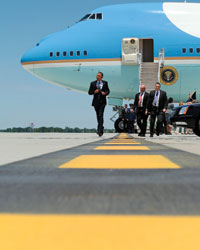
|
||
|
On the big issues of the day — jobs, the deficit, taxing and spending — the White House is counting on the clarifying effect of the election to bring Republicans to the table. If Obama wins re-election, Democrats say, Republicans in Congress will be unable to simply block the president’s proposals but instead will have to come to the negotiating table. “You cannot go through what we’re going to go through, have the kind of sharply defined choice, and then continue to play out the gridlock as if an election didn’t happen,” Gibbs said.
Romney’s vice presidential selection of Wisconsin Rep.
Maryland Democratic Rep.
Expect Obama to talk about “investing in the economy from the middle out instead of a U-turn to the trickle-down economics of the past,” Van Hollen said. The president will highlight the Republicans’ devotion to tax cuts for the wealthy, a prescription that, Van Hollen expects him to say, increases the deficit and leads to higher costs not only for seniors who receive Medicare services but for everyone, from college students with loans to businesses stymied by inadequate infrastructure. “The rest of the country will bear that cost,” he said. “The reality is, Mitt Romney’s tax reform plan is a Trojan Horse to help people like Mitt Romney.”
Lichtman, of American University, said Obama also needs to make the case for a Democratic Congress to replace a House majority that has been taken over by extremists unwilling to compromise. “That’s the only way to deal with it,” Lichtman said. “It’s taking a page out of Harry Truman.”
In reviewing his successes, Obama is likely to nod to his foreign policy record, an area where voters consistently give him high ratings. He will surely point to the killing of Osama bin Laden, the end of the U.S. war in Iraq, the drawdown of troops in Afghanistan and perhaps the end of Muammar el-Qaddafi’s rein in Libya.
The administration’s accomplishments have kept foreign policy largely out of the presidential race, in sharp contrast to previous years, when Republicans put Democrats on the defensive for being weak on national security issues. GOP critics of Obama’s foreign policy have been limited to his sometimes stormy relationship with Israel’s conservative leadership and the party’s push for a harder line against Iran’s nuclear program.
In his speech, Lichtman said, Obama has to hit the right tone even as he defends his record. “Hard times require tough remedies and tough leadership,” he said. “This isn’t ‘It’s morning in America.’”
Dealing With the Base
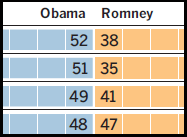
|
||
|
Hitting Harder in Round Two
Obama’s tenure has not been immune from rocky relations with his those in his own party. Reid did not trust former White House Chief of Staff
But even when Democrats controlled both chambers of Congress, Obama had some problems. Despite McConnell’s claim that Obama got “everything he wanted” during the first two years of his administration, much of what he sought remained on the cutting-room floor. Conservative opposition to liberal demands left legislation on climate change stalled in the Senate and comprehensive immigration legislation never got off the ground. And in 2010, with Democrats sensing a tea party wave, the Senate did not adopt a budget resolution.
Moderate Democrats grumbled frequently that the White House was slow to see the tsunami that would become the Republican’s electoral victory in 2010, late to drop the public option in the health care law and blind to the dangers of proposing a cap-and-trade energy policy. Liberals were frustrated with Obama’s preference for offering a compromise without securing Republican concessions. The administration spent months on a push, ultimately fruitless, to build Senate Republican support for the health care overhaul yet didn’t leverage the party’s big Senate majority by making early use of budget reconciliation rules to bypass filibusters.
And even as Republicans acknowledged Obama’s foreign policy as a strength, many liberals objected to parts of it. They were disconcerted by the administration’s assertion of its authority to use drone strikes to kill U.S. citizens who pose a threat to American security, and they were disappointed that the White House allowed its effort to close the Guantánamo Bay prison to be derailed by a combination of logistical difficulties and a congressional rebuke of Obama’s proposal to bring suspected terrorists to facilities in the United States.
Second-Term Agenda
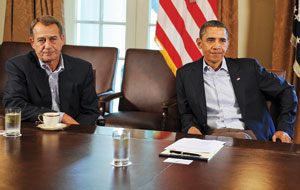
|
||
|
On the campaign trail, Obama has offered the broad outlines of his second-term agenda but has largely avoided explaining how he would get it through an obstructive Congress. He touts his stalled $447 billion jobs-creation package and its host of initiatives, among them a home-loan refinancing program, state aid to hire teachers and firefighters, projects to rebuild national infrastructure and small-business tax cuts to promote hiring. He has packaged and repackaged that plan — sometimes with tax increases on millionaires attached, sometimes without — with little to no success. Republicans also have repeatedly balked at the proposal he’s pushing the hardest: a “balanced” deficit-reduction plan that includes tax increases on households with annual income of more than $250,000.
Without a defining power shift in Congress, few of these proposals are likely to be any more popular with Republicans next year than they are today. And the odds are high that Obama will have to sit down with Boehner once again. If given a second term, Obama will probably have to resort to brinkmanship, as did both President Bill Clinton, who hung tough amid two government shutdowns, and President George W. Bush, who managed to get Congress to fund a surge in Iraq even after Democrats took control of Congress on an end-the-war platform. “It’s the only way he’s going to get anything out of them,” Lichtman said. “He doesn’t have any goodies to give them.”
Obama will more easily be able to press Republicans to negotiate on his terms in a second term because he won’t have to worry about re-election. But, Lichtman noted, if Obama had pushed harder against Republicans in any of the major showdowns over the past two years and sparked a government shutdown or debt crisis, the move could have sunk the economy and crippled his re-election prospects.
What’s more, Republicans will no longer be focused on denying him re-election. Baker, of Rutgers, sees Obama taking a more confrontational approach toward Congress. “Very often when idealists are frustrated, they reach for the heavy weapons,” he said. “He’s gone from being the one who is always searching for a Republican to do the big deal with, to being willing to bring the whole temple down on his head.”
Indeed, Obama will have substantial leverage: the so-called fiscal cliff, which requires action by year’s end on the expiring 2001 and 2003 tax cuts, action early next year to avert automatic spending cuts that threaten to slash defense and domestic spending in equal shares and action early next year to increase the government’s borrowing authority. “The fiscal cliff changes everything,” Durbin said. Republicans realize that “doing nothing is not an alternative, and that’s been the Republican strategy the last two years.”
“We can only hope that
Some Senate Republicans are already reaching out to Senate Democrats about working on a number of legislative initiatives after the elections, with hopes for issues such as a longstanding effort known as the DREAM Act that would permit some undocumented young people to become citizens.
Hitting Harder in Round Two
Republicans and Democrats alike, particularly in the Senate, say they have grown weary of the partisan show-votes that have dominated the House and Senate this year and want to push an overhaul of the tax code and a longer-term transportation measure.
The principle of lowering rates and eliminating loopholes has strong bipartisan support, but because legislation can be hampered by even the smallest detail, lawmakers in both parties are exploring the creation of a fast-track process for pushing such a tax overhaul through Congress early next year. Bipartisan efforts to address the nation’s energy policy also are possible, lawmakers say.
Utah Sen.
Still, Republicans fear that Obama, freed from re-election concerns, will use his executive powers in a second term to push things through without Congress’ help, as he did earlier this year in ending the deportation of some illegal immigrants brought into the United States as children and in installing a director at the Consumer Financial Protection Bureau in defiance of a Senate filibuster.
Obama has acknowledged as much. “Where Republicans refuse to cooperate on things that I know are good for the American people, I will continue to look for ways to do it administratively and work around Congress,” he said in interview with Time two weeks ago.
The president, however, said in an Associated Press interview last week that he is prepared to cut deals with Republicans during a second term and that he hopes GOP lawmakers will be more flexible after the elections. “I’m prepared to make a whole range of compromises,” Obama said, leaving little doubt that the talks will have to incorporate his positions.
Also last week, Boehner said that he is willing to engage with Obama to solve the nation’s problems. The Speaker has sharply criticized Obama for what he calls his unwillingness to tackle the growth in entitlement spending and to work with Congress. “I’ll sit down with anyone on either side of the aisle. I have a long track record of working across the aisle, with people like Ted Kennedy, for God’s sake,” Boehner said. “And I have no doubts that, if required, I can find common ground with the president.”
This week, Obama has perhaps his best chance to reignite the magic he sparked four years ago and make his case for another term to deliver results. The stakes couldn’t be higher.
Steven T. Dennis is a staff writer for Roll Call. Also, Roll Call staff writer Meredith Shiner contributed to this story.
BARACK HUSSEIN OBAMA II
Residence: Chicago
Born: Aug. 4, 1961 Honolulu
Religion: United Church of Christ
Hitting Harder in Round Two
Family: Married Michelle LaVaughn Robinson in 1992 two children: Malia (born1998), Sasha (2001)
Education: Occidental College, attended 1979-81 Columbia University, B.A., 1983 (political science) Harvard University, J.D., 1991
Career: Analyst, Business International Corp., New York, 1983-84 organizer, New York Public Interest Research Group, 1984-85 director, Developing Communities Project, Chicago, 1985-88 director, Illinois Project Vote, 1992 associate, Davis, Miner, Barnhill & Galland of Chicago, 1993-96 lecturer, University of Chicago Law School, 1992–2004
Political highlights: Elected as Illinois state senator for the 13th District in 1996, 1998 and 2002 lost 2000 Democratic congressional primary in Illinois’ 1st District, garnering 30 percent against incumbent Rep.